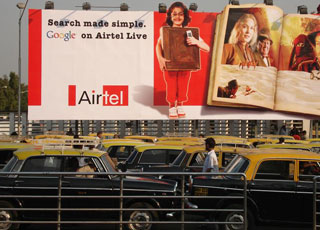
By Matthew Reed
As the great and good of the mobile industry browsed the exhibits at the Mobile World Congress trade show in Barcelona this week, they may have overlooked a couple of watershed moments in emerging-market telecoms.
In the past week, Indian and Chinese investors have unveiled plans for their biggest investments in African telecoms to date. India’s Bharti is in exclusive talks with Zain to buy the latter’s operations in sub-Saharan Africa for US$10.7 billion. And a consortium including China Unicom is the highest bidder for Nigeria’s fixed and mobile incumbent, Nitel.
The Bharti-Zain deal not only marks the beginning of one era but also the end of another, as Zain will quit sub-Saharan Africa after being one of the biggest and expansionist players on the continent over the past few years. (Zain has not sold its operations in Morocco or Sudan, which it classifies as Middle East units.)
Saad Al Barrak, who has championed the company’s expansion across the Middle East and into Africa as Zain’s talismanic CEO since 2002, has resigned, though he remains CEO of Zain’s Saudi Arabia unit.
For Bharti, which in 2009 was thwarted for the second year in a row in its efforts to merge with South Africa’s MTN, the takeover of Zain Africa would give it a substantial and long sought-after presence in the fast-growing African mobile market.
Other moves by Indian operators into Africa have been quite low-key: Essar has launched a GSM network in Kenya and has acquired Warid’s assets in Congo and Uganda; Reliance has a license in Uganda; and Tata is a backer of South Africa’s Neotel.
Bharti, which is India’s largest mobile operator through its Bharti Airtel unit with 118.86 million subscriptions at end-2009, will be hoping that it can take advantage in Africa of the business model that has brought it great success in its home market.

Bharti’s business model is based on outsourcing much of its operations so that it is lean and efficient and can operate profitably despite India’s very low ARPU levels, of about US$5 per month.
In 2009, Bharti Airtel recorded a net profit of US$1.6 billion and a net profit margin of 22.9%.
On Zain’s part, the drive to sell was led by the Kharafi group, the largest private investor in Zain, which has decided it is time to cash up its investment. Kharafi also seems to have tired of the mixed results that Zain has had in Africa.
Zain Africa accounted for about 38% of Zain group’s revenues in the nine months to end-3Q09, but the Zain Africa operations as a group made a net loss of US$111.6 million over that period. Seven of the 15 Zain Africa operations were loss-making. Zain Nigeria alone accounted for 16% of Zain group revenues in the nine months to end-3Q09 ” but the Nigerian unit posted a net loss of US$88.3 million in that period.
In that context, the US$10.7 billion price ticket for Zain Africa seems quite steep. But Bharti is acquiring a large portfolio of operations and it might well be able to use its Indian experience to substantially improve on their performance.
However, Bharti will also have to master numerous local factors if it is to succeed in Africa. And Bharti has not had huge experience of operating outside India, as it only recently made forays into Sri Lanka and Bangladesh. Network-sharing, which is an important part of the Bharti recipe in India, is barely evident in Africa. But Bharti may be able to take a lead in popularizing network sharing on the continent.
Chinese vendors, led by Huawei and ZTE, have become increasingly prominent as network equipment vendors in Africa, but that has not been matched by Chinese operators. A few years ago, China Mobile was tipped as a possible buyer of Millicom, but no deal was reached.
Now China Unicom, China’s No. 2 mobile operator, is part of the New Generation consortium that has offered US$2.5 billion for a 75% stake in Nitel. Again the price seems steep, at US$1.5 billion more than the next highest bid, and substantially more than the US$500 million that Nigerian conglomerate Transcorp agreed to pay in 2006 for a 51% stake in Nitel in an earlier privatization that has since been revoked. In addition, Nitel’s mobile unit, M-Tel, is barely operational.
But Nigeria is Africa’s most populous country and its largest single mobile market. New Generation also stands to acquire Nitel’s stake in the SAT-3 undersea cable and a terrestrial backbone as part of the deal.
As two South-South engagements stand ready to proceed (Bharti and China Unicom’s moves into Africa), a third ” Zain’s involvement in Africa ” is in retreat.
But Zain may benefit from the opportunity to concentrate more closely on its Middle East operations.
****
Matthew Reed is a principal analyst Informa Telecoms & Media
 The Independent Uganda: You get the Truth we Pay the Price
The Independent Uganda: You get the Truth we Pay the Price


